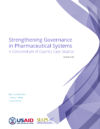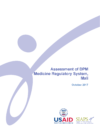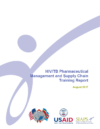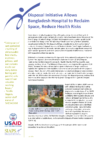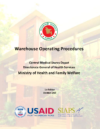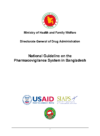SIAPS and its predecessor programs have assisted numerous countries in strengthening governance to promote robust decision making, enhance accountability, reduce opportunities for corruption, and improve efficiencies to enable better access to and use of quality-assured medicines. This compendium draws on these experiences and provides a collection of examples of strategies and approaches for strengthening governance … Read more
Bangladesh, Cameroon, Democratic Republic of Congo, Ethiopia, governance, H Walkowiak, Philippines, S Putter, Sierra Leone, Swaziland, T Hafner, Ukraine
A comprehensive assessment of DPM’s medicine regulatory system was conducted September to October 2017 by SIAPS funded by USAID. The WHO Global Benchmarking Tool was used for data collection. The scope of the assessment was focused on the five regulatory functions: national regulatory systems, medicines registration and marketing authorization (MA), pharmacovigilance (PV), market surveillance and … Read more
Yousef Makar is the Chief Pharmacist at the Windhoek Central Hospital, Namibia’s national referral hospital for specialised health care services for the past five years. Before July 2016, Yousef and other pharmacy managers in government health facilities faced huge challenges in managing the inventory of pharmaceuticals with frequent stock-outs of key pharmaceuticals because consumption information … Read more
By Francis Aboagye-Nyame, SIAPS program director Greatjoy Mazibuko was a pharmacist at the Oshakati Intermediate Hospital in Namibia working with ART patients. Every day, he rose at dawn, not knowing how many patients he would have that day. He often worked for 12 hours or more; patients were kept waiting for hours, perhaps having traveled … Read more
According to the World Health Organization, many countries spend 30–40% of their health care budgets on medicines and medical commodities, and a significant amount of the funds are wasted because of irrational medicines use and inefficiencies in stock management due to lack of skills. Other serious problems that health care organizations face include the overuse … Read more
In Bangladesh, the Ministry’s Procurement and Logistics Management Cell (PLMC) made an assessment of the status of medical equipment that was no longer usable and explored the logistics in health facilities across the country to accelerate the disposal process. The PLMC and SIAPS conducted seven divisional workshops on condemnation of medical and non-medical items for … Read more
There has been a long‐recognized need of Central Medical Stores Depot (CMSD) staff for a complete collection of documents representing the up‐to‐date warehouse management standard operating procedures (SOPs) of CMSD: there was no such resource capturing all the operational procedures, circulars, registers, office orders, and so on used in the different sections involved in CMSD’s … Read more
A presentation by Mohan P. Joshi, Principal Technical Advisor and Lead for Pharmaceutical Services, SIAPS. Presented at a side event during the 2018 Prince Mahidol Awards Conference on the theme “Monitoring and Improving Medicines Quality through AMR National Action Plans”, organized by USP, USAID, the Thai Food and Drug Authority, and the Thai Department of … Read more
The objective of the National Guideline on the Pharmacovigilance System in Bangladesh is to guide health care providers (HCPs) and other key actors in the health and pharmaceutical sectors on the operations of the PV system. This document gives an overview of what PV is, how to detect and classify ADRs, and the structural organization … Read more
SIAPS Final Report showcases achievements across 46 countries. Interventions are described by intermediate results and health areas and demonstrate how SIAPS successfully worked with a range of stakeholders, including Ministries of Health, to bolster pharmaceutical systems and address country-specific needs. [button style=”download” link=”https://siapsprogram.org/wp-content/uploads/2018/03/SIAPS-End-of-Program-Report.pdf” color=”silver”]Download this file as a PDF[/button]
